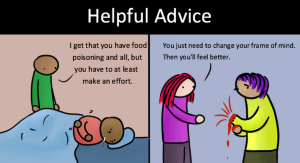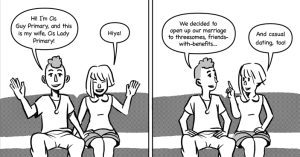
Side view of a parent consoling their teenaged child.
When your friend, partner, or family member opens up to you about a mental health issue, anything you subsequently say will probably be intended to help.
The problem, of course, is that good intentions alone can’t make someone feel better.
In my experience, in fact, well-intentioned people can leave you feeling worse.
At various points in my life, I’ve dealt with anxiety, depression, disordered eating, and workaholism (which isn’t officially considered a mental illness, but is linked to them and at least feels like a mental health issue to me). And I really do appreciate that my loved ones want to help.
But their attempts to help have often backfired, because a lot of the things they’ve said have actually trivialized my problems.
Here are a few things people have said to me and often say to people with mental health issues but probably never should’ve.
1. ‘Everyone Goes Through That’
“Everyone gets stressed.” “Everyone feels blue sometimes.” “Most women struggle with body image.”
We get that – but it’s not what we’re talking about.
It’s always nice to know we’re not alone, but there are ways to remind us of that without implying that our mental illness is not, in fact, an illness.
Because that’s what you suggest when you compare depression to feeling blue or anxiety to feeling stressed. You’re unintentionally gaslighting us by saying that our serious conditions are less serious than we’re making them out to be.
It’s true that we’re in good company. Many other people have mental illnesses. And even more people have less severe forms of the emotions we’re experiencing.
But a better way to say that might be just that: “Know you’re not alone.” This implies that some people do experience what we do without saying that everyone does or that it’s not that big a problem.
2. ‘There’s No Use Being Upset’
It would be great if we could all stop being upset once we realize it’s not useful. But many of us can’t.
This is one of the most patronizing things you could say to someone with a mental illness. It implies that our feelings are useless, feelings should be useful, and that we’re weak for doing something useless.
It also suggests that we believed being depressed or anxious was useful in the first place, and simply needed to be corrected by someone who knows better than us.
Of course we’d be better off if we didn’t have to deal with unpleasant emotions all the time. Of course we know that ideally, we could see the positive in everything and feel energetic and happy and connected to other people.
The problem is, we don’t. And we dislike that fact as much as you do. It’s not a choice.
Plus, sometimes there’s some use in being upset. Sometimes being upset lets us acknowledge that things in the world or in our own lives are bad. That helps us call out larger social injustices as well as individual problems – and may, at some point, empower us to do something about it.
Don’t tone police us and tell us to be happy when there are a lot of reasons not to be. Our feelings are valid, whether they’re useful or not.
3. ‘You Have It Really Good, You Know’
After I told a friend of mine I’d been feeling very anxious lately, he told me that I should really take a trip to India and see all the poverty and suffering there, and then when I come back, I won’t feel bad about my own life.
First of all, people really love to invoke non-Western countries in these conversations, which is messed up in its own oppressive right. But also: As if my problem were that I don’t think I’m fortunate!
People with mental health issues often know all the ways they’re fortunate. The problem is, that doesn’t make them feel better. And that alone is devastating.
I’ve spent many mornings in front of the mirror reciting all the good things about my life – “my job is great, my apartment is beautiful, my boyfriend is so sweet” – because I so, so desperately wanted to be impacted by those words, to really feel them.
So understand that. Understand that we’re trying. And when we don’t succeed, it’s not for lack of effort.
Give us the benefit of the doubt. Don’t think we’re just spoiled and ignorant of how more marginalized people live. People with mental health issues are often extremely aware of themselves and others.
And even if other people may have physical, concrete problems, mental problems count, too. Telling someone with depression that they should feel luckier than someone with, say, heart disease once again is gaslighting, because it implies that depression is not so bad.
Forcing myself to feel lucky would deny the pain I feel, and that’s not healthy.
What’s healthy is accepting that though there are many ways I have it good, there are also many ways I don’t, and one of them is that “having it good” doesn’t make me feel good. That counts.
When we acknowledge what’s not right in our lives, we become empowered to seek help and put the pieces back together. We also just become more in touch with our emotions, which is worthwhile in and of itself.
4. ‘That Makes Me Feel Bad’
When your own mental health may be compromised by hearing about someone else’s problems, you have the right to draw boundaries. If talking about my own issues is triggering to someone, I’ll respect that and talk to someone else.
But some people create this situation unintentionally.
When they casually talk about how nervous it makes them to hear about my self-destructive thoughts or how sad they get when I’m sad, I’ll stop reaching out to them, because I know I’ll just end up feeling guilty if I do.
Many people have positioned themselves as people I can’t confide in this way.
After my first breakup, my dad regularly called me sounding concerned, telling me that when your child goes through this, it’s just as bad for you. So now, I don’t tell him about my relationship problems, and if he must find out, I try to hide the pain, sending reassuring e-mails about how great I’m doing.
When I told my boyfriend that sometimes, I get so depressed I can’t even get excited about our relationship, he told me that it really hurt him. Now, I don’t talk to him as much about my depression.
Again, boundaries are absolutely fine to have. But I think some people don’t even realize they’re putting them up when they express how my problems make them feel.
Remember, having a mental illness is worse than hearing about one. So try not to make it about you.
Let your partner know you’re there for them and that even if it sometimes hurts you, you can handle their pain. Sometimes, we don’t express our pain out of fear that others can’t handle it, so know that we’re not imposing means a lot.
5. ‘Oh, Okay – How Is Everything Else?’
Particularly with certain issues like workaholism or compulsive dieting that are sanctioned and even praised in our society, people act like it’s no big deal that you’ve just confided in them and you can just move on with the conversation.
I remember telling a friend over e-mail that I was in a dark place with workaholism, and he responded, “Oh, okay. How’s Germany? Have you tried the leberkäse?”
Wrong answer.
We can talk about leberkäse when I haven’t just worked up the energy and courage to confess something I’ve been keeping bottled up inside because I was afraid of getting an insensitive reaction – and then gotten that reaction.
If somebody brings up a mental health problem with you, listen. It might’ve not been easy for them to bring it up in the first place. And by dismissing it, you’re reinforcing their fear that there isn’t space for them to talk about it. That is, after all, what society’s taught us all along.
And don’t ask them how everything else is, because when you’re consumed by depression or anxiety, it feels like there is nothing else.
***
So, What Should You Say?
I don’t want to leave you with nothing to work with here. I know if I just tell you what not to say, you won’t know what to say. So, here are a few suggestions for things to tell someone with a mental health issue.
“Is there anything I can do to help?”
No matter how many things someone could do to make us feel better, we often don’t even think to ask because we assume it’s not on the table.
A friend once asked me this when I confided in her about an eating disorder relapse, and I suddenly realized there were so many things I wanted, but been afraid to ask for: to tell her when I felt triggered, to receive periodic encouragement from her, to get reality checks about my body image.
Don’t assume people will just reach out to you if they want something. We’d likely feel too guilty about it or not even think of it. Actively remind us that you’re happy to help.
“I love you.”
This is always good to hear, whether you’re dealing with a mental health issue or not. There’s nothing better than knowing others love and care about us.
That can help you feel better about just about any situation, and it can also make it less daunting to reach out.
“I’m sorry you’re feeling bad.”
It’s so rare, yet so powerful to hear that someone sympathizes with you – that they’re willing to feel and understand and stay with your pain instead of trying to sweep it under the rug.
This means that person is prepared to embrace all of you, not just the pleasant parts, because they love you that much.
I remember when I told my grandma I had an eating disorder at age seventeen. I didn’t elaborate, and I don’t think she really understood what an eating disorder was. But it didn’t matter, because she said, “Oh honey, I’m so sorry. You’re very strong. You’ll get through it.”
What was important wasn’t her opinion on eating disorder recovery. It was her love for me. And that was all she had to say to convey it.
[do_widget id=’text-101′]
Suzannah Weiss is a Contributing Writer for Everyday Feminism. She is a New York-based writer whose work has appeared in The Washington Post, Salon, Seventeen, Buzzfeed, The Huffington Post, Bustle, and more. She holds degrees in Gender and Sexuality Studies, Modern Culture and Media, and Cognitive Neuroscience from Brown University. You can follow her on Twitter @suzannahweiss.
Search our 3000+ articles!
Read our articles about:
Our online racial justice training
Used by hundreds of universities, non-profits, and businesses.
Click to learn more




















